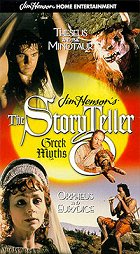Drehbuch:
Anthony MinghellaKamera:
Roger PrattMusik:
Rachel PortmanBesetzung:
Michael Gambon, Brian Henson, Gina Bellman, Derek Jacobi, Robert Flemyng, Frances Barber, John Wood, Lindsay Duncan, Amanda Burton, John McEnery, Tom Ward (mehr)Inhalte(1)
One of Jim Henson's finest hours was the "Storyteller" series that aired on HBO in 1987. As with his other non-Muppet creations ("Labyrinth"), Henson fills the screen with wonderful creatures that have a wisp of a J.R.R. Tolkien fantasy. Half of the eight-part series was adapted from Greek myths by Anthony Minghella, who became an Oscar-winning filmmaker a decade later with "The English Patient". Minghella weaves the narration of the storyteller (a sturdy and wonderful Michael Gambon, accompanied by a scene-stealing dog) with dialogue from the stories to beguiling effect.n By nature, the Greek myth episodes are a bit more mature and downbeat (ages 8 and older) than the rest of the series, yet give the audience lasting impressions of oft-quoted tales. In "Perseus and the Gorgon," King Argos locks away his wife when it is foretold his future son will kill him. Soon mother and son (Perseus, fathered by none other than Zeus) are washed ashore and another angry king looks to take away Perseus's mother. How can Perseus win the day? By killing the evil Gorgon whose snake-covered head includes eyes that turn humans into statues. Derek Jacobi stars as the brilliant Greek designer in the second tale, "Daedalus and Icarus." The father goes through many hardships, including the famous episode of his son flying too close to the sun. All is not well and does not end well. John Madden directs the tale of "Theseus and the Minotaur." A young man reunites with his father, King Aegeus, but is cursed by his witch of a stepmother (literally). When Theseus tries to stop the regular sacrifice to the half-bull, half-man Minotaur, a new curse awaits the young prince. The magical musician Orpheus finds his muse in "Orpheus and Eurydice." Unfortunately, she soon dies and goes to Hades where Orpheus follows, attempting to win her soul from the devil himself. (Verleiher-Text)
(mehr)Galerie (2)
Photo © Columbia TriStar Home Video

